- Home
- Ian McDonald
Luna--Wolf Moon--A Novel Page 14
Luna--Wolf Moon--A Novel Read online
Page 14
‘Pretty.’
‘The theory is that the image has always existed. The artist just found it,’ Wagner says. ‘You see that patch where the gilding is worn away? Lips did that. Thousands of lips. Maybe millions of lips. You kiss the icon, the love is transferred to the Lady.’
‘Those Vorontsovs believe some weird shit. Three claims, Wagner Corta. You used one of them getting me here.’
‘Keep him safe.’
‘The boy?’
‘Would I claim for anything else? Keep him safe from Bryce. In the dark time. When the pack breaks up. When I’m away. Watch over him.’
‘I can do that, Wagner Corta,’ Denny Mackenzie says. ‘I give you my word on that. That’s two claims. You have one more.’
‘No,’ Wagner says. ‘Not yet. I’ll know when I need it.’
‘So be it. Our business is done, Wagner Corta?’
‘Done.’
Wagner remains in the tiny chapel. The icon of the Theotokos of Konstantin is set low, to bring to their knees everyone who would revere it or marvel at it or be baffled by it or simply seek solace from it.
I have made a deal with the man who killed my brother, Wagner tells the little icon. I have placed the boy I’m sworn to protect in the hands of my enemy. Do you condemn or do you forgive, Lady?
The icon says nothing. Wagner Corta feels nothing.
* * *
Lady Sun sighs at the castles and dragons. Banal. She rolls her eyes at the manhua princesses and great moments in handball. Technical but tedious. She walks through the grove of woven trunks and branches without a sideways look.
‘Now,’ she says, ‘this.’
The hollow cube is suspended from the dome by invisible lines. It seems to float in the air. The cube is hollow, its faces have been pierced with geometric patterns inspired by the Moorish architects of the Alhambra Palace. A light source hangs at the centre of the cube and casts a web of woven shadows across the two visitors standing before it. Lady Sun’s breath hangs in the air and in turns becomes a surface for the interplay of shadows from the worked cube.
‘Precision lasers,’ says Sun Zhiyuan. ‘Thaw, freeze action.’
‘I don’t want to know how the trick is done!’ Lady Sun snaps but takes her grandson’s arm and draws him close to her. Condensation from her breath is already freezing on the fur of her hooded cape. She shivers, though the cold is nowhere near as deep as when the ice field was first discovered. Water held as ice for two billion years in the perpetual shadow of Shackleton crater, while the peak of Malapert Mountain burns in eternal light. Ice and fire, darkness and light, the opposing elements out of which the Suns built the moon, lying next to each other. Three quarters of the ancient ice is gone, what remains is more than enough for the annual ice sculpture festival; for a hundred Zhongqiu. Castles and dragons. Dear gods.
This cube in its simplicity and geometric elegance pleases her.
‘Who made this?’ Lady Sun asks.
Her grandson names three kids Lady Sun cannot tell from the woman who hand stitches her shoes. Lady Sun walks around the Alhambra cube, through changing shadow-scapes, and thinks about her warm, softly lit apartments.
‘I believe that Lucas Corta is alive,’ she says.
‘That would be important news,’ Zhiyuan says.
‘For many reasons,’ Lady Sun says, continuing her orbit around the ice cube. ‘I had discreet enquiries made. Amanda tells me that the rover in which Lucas Corta died was never found. No body, one’s suspicions are naturally aroused. I had my agents run a satellite scan mapped against the range of a surface rover. They found it adjacent to the Central Fecunditatis Moonloop tower. The Vorontsovs are an endless trial of frustrations and obfuscations but my agents did find a record of a capsule launch at a time commensurate with an escape by rover from João de Deus.’
Lady Sun takes her grandson’s arm again and draws him round to the third face of the ice lantern.
‘Understand that discretion is everything. The evidence was slight, but evidence nonetheless, that Lucas Corta escaped off world by Moonloop. There is only one place he can go. If the Vorontsovs have been sheltering him, they are invested in keeping it secret. Too heavy a touch might alert them.’
‘Nevertheless…’
Lady Sun squeezes Zhiyuan’s arm. ‘I am a nosy old woman. It was quite irresistible. The Vorontsovs are certainly keeping something secret, in space and on Earth. Money is moving. Money walks with a heavy tread. Terrestrial corporations are forming new venture capital groups. VTO Earth has come to an agreement with the Russian government.’
Zhiyuan lets go his grip on Lady Sun’s arm.
‘That’s impossible.’
‘More than that. My whisperers inside the Chinese Communist Party have gone quiet. That concerns me. They are afraid. Conspiracies assail me. Earth contrives and the Eagle of the Moon finds his board turn against him? Lady Luna allows no coincidences.’
‘What do you suspect, nainai?’
‘Lucas Corta is coming to take back what was stolen from him. He will have his revenge on those who destroyed his family.’
‘Can the Three August Ones give us a foresight?’
‘I am reluctant to involve them.’ A tug on her grandson’s sleeve draws him on to the final facet. Lady Sun closes her eyes in the broken light streaming from the cube of ice. ‘We cannot act openly on this. Amanda will suspect that we know she lied to us about killing Lucas Corta. Her position on the board would be finished. She’s been humiliated by Lucas Corta once: that divorce. Twice she will not allow. Involve the Three August Ones, and the whole board will know.’
‘We have to know who we can trust. I will proceed discreetly and correctly. There will be no error.’
‘Thank you, Zhiyuan.’ Lady Sun links arms again. The frost is thick on the fur of her hood. ‘Now, I’ve had quite enough of this frozen hell. Take me back for a nice warm glass of tea.’
* * *
It’s a fantastic opportunity.
It’s true. Nothing more true. How is it then that the greatest truth sounds like the feeblest lie?
I have a chance – one chance Luca – to study at the Cabochon.
And he’ll say, Cabochon? And she’ll have to explain again that it’s the foremost political colloquium working on alternative models of lunar governance. And he’ll say What? and that will blunt it, blur it. Cuts should be fast, sharp, clean.
It’s a year. It sounds like forever, but it’s not. And it’s only Meridian, that’s an hour on the train. It’s a year, it’s not the end.
But it is the end. Colloquium relationships don’t work, her friends all say. Never have, never will. Break it off. He could come with me. Hands go up in horror. Are you insane? That’s worse. He’ll follow you round to all the political salons and cocktail parties and at some point you’ll catch him out of the corner of your eye and for a moment you won’t see Lucasinho Corta; you’ll see a pet; and beyond that a point when you’re ashamed of him and beyond that a point where you stop inviting him and a point where he no longer cares that you don’t invite him.
So it has to be over and it is over. That is settled. The next question then: How to tell him it’s over?
Familiar, her friends say. It’s the modern way. I can’t do that. He deserves better. Deserves better? He’s moody, he’s needy, he has no ambition and no self-respect and he’ll fuck anything with a pulse – and he has – and good sex and better baked goods do not compensate for that. And she says: Yes, and add infuriating, vain, trivial, bored, demanding, insensitive and emotionally illiterate. And hurt hurt hurt. Hurt more than anyone she has ever known, more deeply. Scarred to the bone. He needs her. She doesn’t want to be needed. She doesn’t want a dependant. You can’t let your life be trapped by another’s.
When the tiny package had been delivered to her hand, brought by BALTRAN from Meridian, when she had found the two halves of the ear-spike inside, she had called the council of her abusua. They had not hesitated. The metal was the cont
ract. She gave it back to Lucasinho and without a thought he slipped it through his ear, though its magic was used up. He still wears it. When he annoys her, when she hates him, she thinks he wears it to remind her that she owes him for her brother Kojo. That she will go on owing. That the debt is his to discharge, or hold. It is a small titanium hook in her freedom. She wants to shout: It’s our debt, not my debt.
She hates him now. Then she sees his eyes; those Sun cheekbones; his full, lovely boy-lips. The swagger, the sly smile that hides and displays so many fears.
Can he read? she asks her familiar. A card, a piece of writing would be personal but keep the necessary distance.
He has a reading age of six, her familiar replies.
What did those Corta madrinhas teach their kids?
No letter, no familiar-to-familiar fuck off. It will be face to face. She dreads it, she is already running the script in her imagination. He is faithless and needy and annoys her more than anyone else she has ever known but this much she owes him.
Book me a table at Saint Joseph, she orders. It’s classy and neutral and far enough away from her social orbit for friends not to be there.
She’s going to miss the cakes.
* * *
The bar on the train refuses to serve him. First he won’t accept it. The bar is polite but insistent. Then he shouts, Do you know who I am? The bar does but train bars have no facility for social status. Last he punches it, so hard he cracks the fascia. The bar reports damage and prepares a small legal claim.
I think you should go back to you seat, Jinji says. Passengers are staring.
‘I want another drink.’
I’d advise against that. Your blood alcohol is two hundred milligrams per hundred millimetres of blood.
He refuses out of petty defiance but it is a worthless rebellion, defying a familiar. On the way back to his seat he glares down anyone who dares make eye contact.
This is the third day of Lucasinho’s binge. The first day was chems. A dozen custom houses, twice that many narcotic DJs. His mind, his emotions, his senses spun from high to low to out to in; colours and sounds expanding and contracting. Chems and sex: armed with a bagful of erotics he went to Serpent House, where Adelaja Oladele the Master Edger lived, and a house of cute boys who welcomed his bag of sexy-highs like Yam festival.
His aunt Lousika called him, messaged him, implored him to come home until he shut down Jinji and locked himself into a bubble of bodies, sweat and cum. Taking himself offline was the only thing that stopped him abuse-bombing Abena over the social network. The second day, still descending ten different paths from ten different highs, he took what was left in his bag of treats round to Kojo Asamoah. Kojo made him tea, put him to bed, folded himself around Lucasinho while they shared out the last of the pharmaceutical treats and fended off all the questions about why his sister had gone to Meridian, why she didn’t think enough of him to stay, why nobody stayed, ever. By morning Lucasinho was gone. Kojo was relieved. He had dreaded having to blow him all night.
The third day Lucasinho went drinking. Twé was an ecosystem of tiny drinking places, from thatch shacks to pool bars to cubbyholes carved out of old rock, so small the clients fitted into them like segments of tangerine. Lucasinho was not a drinker. He did not know that there was a strategy to bingeing so he drank fast and freely and catholically. He drank spirits and stuff not made from printers; hand-made drink, banana beer and yam beer, pumpkin beer; Twé cocktails that were unlike anything else on the moon. He was a terrible, amateur drunk. He bored people. He forgot sentences. He stood too close. He took off his clothes in company. Twice he threw up. He didn’t know alcohol could do that. He fell asleep on a potential lover and woke with a headache he was certain, certain, would kill him until Jinji, in offline mode, told him it was dehydration and a litre of water would ameliorate it.
Then he woke up and found himself folded up in the seat of a high-speed train. Wanting another drink. Which the bar refused him.
‘Where am I going?’ Lucasinho asks but before Jinji can answer he hears a man’s voice speaking to a child, and the child answering, both in Portuguese and at the sound of the hummed nasals and burnished sibilants Lucasinho pulls his knees in to his chest and sobs silently, convulsively.
João de Deus. He is going back.
He’s the last off the train, the last through the passenger lock; the last standing, unsteady, on the platform of João de Deus station. So many times across this shining floor. To friends and amors and the great cities of the moon. To his wedding. To Meridian, when he ran away from the boredom and confinement of Boa Vista and he discovered that on a world as small as the moon all running away from is running to and that all he was exchanging was a small cave for a larger one.
‘How’s my eye make-up?’ Lucasinho asks. He remembers now, putting on the slap in Kojo’s toilet. Not the full ensemble; something to make him feel wild and fierce, something to mark that Lucasinho Corta is returning to João de Deus.
I’m offline so I can’t see, but your last application was three hours ago so I recommend a little touch up.
The washroom has old-fashioned mirrors. Lucasinho works as deftly as the alcohol in his brain will allow. He admires one profile, then the other. This 1980s retro really suits him.
The smell. He had forgotten it, but smell is the lock of memory and the first breath is all his nineteen years of being a Corta. Raw stone and the tang of electricity. Overworked sewage and the perfumes used to mask it, piss, cooking oil. The vanilla greasiness of printer plastic. Bodies. They sweat differently in João de Deus. The fresh sweetness of bots. Dust. Everywhere, dust.
Lucasinho sneezes.
So small. The prospekts are narrow, the roof so low he cringes from it. Twé obeys an architecture different from any other lunar settlement. It is a city turned on its end; clusters of slim silos a kilometre high, filled with green and true light bounced down cascades of mirrors, not the false sky of the sunline. Twé is a city of hidings and discoveries: João de Deus is open. Kondakova Prospekt, crossed by bridges and catwalks, stretches true before him the city’s hub.
They came through here, on the night of knives. Off the train, through the locks, across that wide station plaza. Ghost soldiers march past Lucasinho, hands on knife hilts. Scorch-marked walls and building fronts; the old Corta Hélio offices hollow like punched-out teeth. His father’s apartment; the finest sound-room in two worlds a mass of fused audio equipment and charred wood.
Santinhos hurry past on foot, scooter, motos. Eighteen months ago the whole moon knew his face. Wedding of the year! Stylish and cute Lucasinho Corta. Some faces turn, some double-take, most don’t even spare him a glance. Is it that they don’t recognise him, or that it is safer not to recognise him?
West 7 catwalk. Lucasinho stands and looks up. The Mackenzies hung Carlinhos’s stripped body by his heels from those girders. Arms and long hair and dick hanging down. Throat opened. They drove him to his knees with tasers, they closed in around him. So many blades. He could not escape. While Lucasinho hid in Twé, protected by the knives and living weapons of the Asamoahs.
Mackenzie Helium logos on office fronts, bots, the banners that drape fifty metres from the higher levels. A duster in a sasuit passes, fingers hooked through the faceplate of a helmet that carries a small MH on its brow. There are more white faces than he remembers. The hot-shops and tea-houses and bars chalk up their daily specials on the wall in Portuguese and Globo. English on the streets; Australian accented.
I can’t protect you if I’m offline, Jinji says, as if reading his thoughts. Perhaps it is. Perhaps its circuitry has worked its way through his skull into the folds of his brain, reading the spark of neurons. Perhaps it just knows Lucasinho so well that it has become an echo of his mind.
Lucasinho stops at the entrance plaza to the Estádio da Luz. New lettering, new name, new corporate identity. Ballarat Arena. Home of the Jaguars.
‘Jaguars,’ Lucasinho says.
Terrestrial me
mbers of the cat … Jinji starts.
A voice calls from a higher level; a hey! Lucasinho knows is directed at him. A second call, more doubtful. Lucasinho walks on. His destination is clear now.
The Boa Vista tram station has been screened off with sheeting, sealed with Do Not Cross tapes and the suit-helmet symbol of depressurisation warning. Even without the shuttering, Lucasinho couldn’t have gone there: Boa Vista is dead, depressurised, open to vacuum; locked behind many pressure seals. The foot of the wall is a rippling pool of coloured lights. Biolights, hundreds of them; some fresh and new, some pulsing fitfully on the edge of death. The minuscule lights – red, gold, green – catch on a host of small objects huddling along the lanterns. Closer, Lucasinho sees that they are cheap plastic prints of the orixas and their attributes – both their umbanda and their Christian aspects. The blade of Ogun, the thunderbolt of Xango, the crown of Yemanja.
The four icons are arranged in a triangle; Adriana at the centre. Rafa the apex, the lower points occupied by Carlinhos and Lucas. The images are small, hand-sized, devotional; the frames heavy and decorated with paint, jewels, more plastic votives. The luminescents cast a wavering light over the triangle of faces, over Lucasinho’s face as he squats to examine the other offerings left at the shrine.
A Moços shirt, ’03 season. A T-shirt, contemporary cut, carrying the image of a dust-bike: Serenitatis Endurance Race. Many knives, their tips snapped off. Music cubes which, when Lucasinho lifts them, play the old bossa nova his father and grandmother loved. Pictures, dozens of pictures: dusters and handball fans and wonderful pictures of the old days of the moon, when Adriana built a world. Lucasinho lifts them: the images are old but the pictures smell freshly printed. This bearded, smiling man is the grandfather he never knew, who died before even his father was born. Here are madrinhas with children in their arms and at their sides. Here are the faces of Boa Vista half-carved. These are gods that speak to Lucasinho, things found inside stone, emerging from raw rock. Here are two young women; one his grandmother, the other unknown to Lucasinho. Their heads are together, they smile for the lens. His grandmother wears a compression shirt with the Mackenzie Metals double-M logo. The other woman’s shirt carries a Ghanaian adinkra.

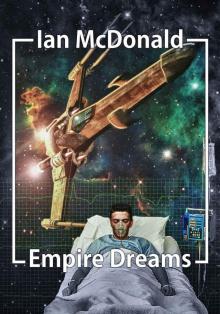 Empire Dreams
Empire Dreams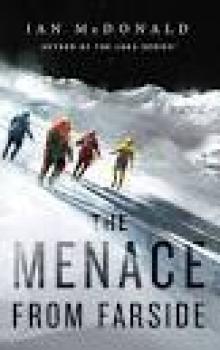 The Menace from Farside
The Menace from Farside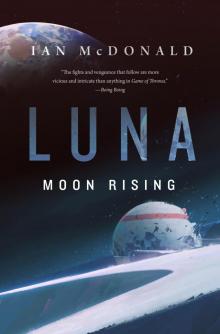 Luna: Moon Rising
Luna: Moon Rising Moon Rising
Moon Rising Desolation Road dru-1
Desolation Road dru-1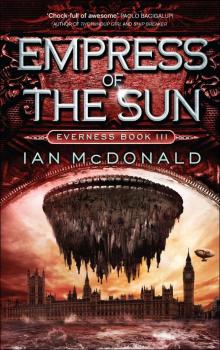 Empress of the Sun
Empress of the Sun Ares Express dru-2
Ares Express dru-2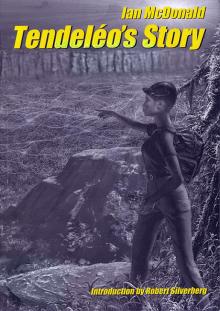 Tendeléo’s Story
Tendeléo’s Story River Of Gods
River Of Gods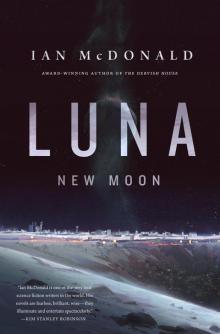 Luna
Luna![Cyberabad Days - [River of Gods 02] Read online](http://i1.bookreadfree.com/i1/03/29/cyberabad_days_-_river_of_gods_02_preview.jpg) Cyberabad Days - [River of Gods 02]
Cyberabad Days - [River of Gods 02]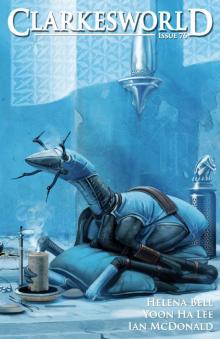 Clarkesworld Magazine Issue 76
Clarkesworld Magazine Issue 76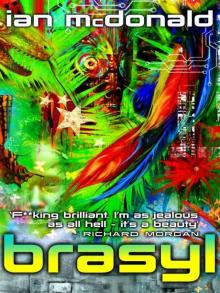 Brasyl (GollanczF.)
Brasyl (GollanczF.)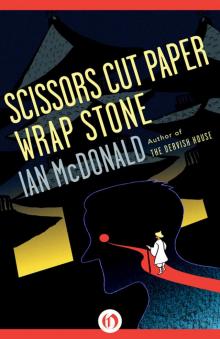 Scissors Cut Paper Wrap Stone
Scissors Cut Paper Wrap Stone Chaga
Chaga Time Was
Time Was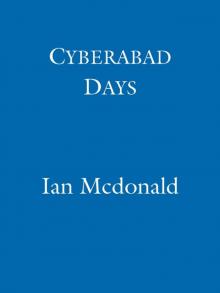 Cyberabad Days
Cyberabad Days Be My Enemy
Be My Enemy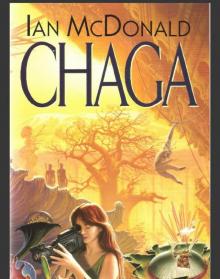 Changa
Changa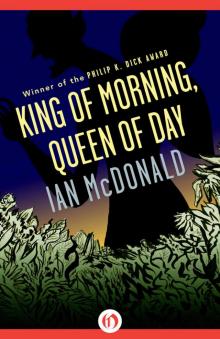 King of Morning, Queen of Day
King of Morning, Queen of Day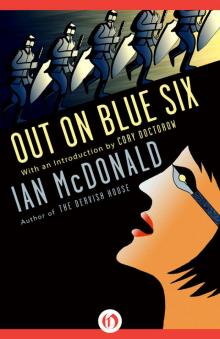 Out on Blue Six
Out on Blue Six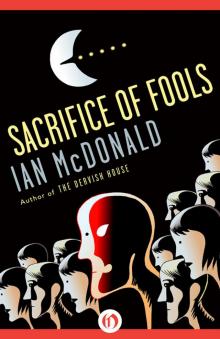 Sacrifice of Fools
Sacrifice of Fools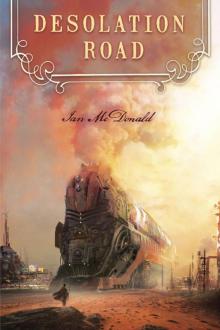 Desolation Road
Desolation Road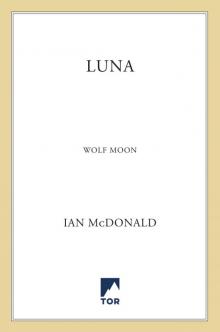 Luna--Wolf Moon--A Novel
Luna--Wolf Moon--A Novel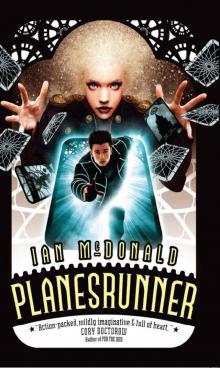 Planesrunner (Everness Book One)
Planesrunner (Everness Book One) Ares Express
Ares Express